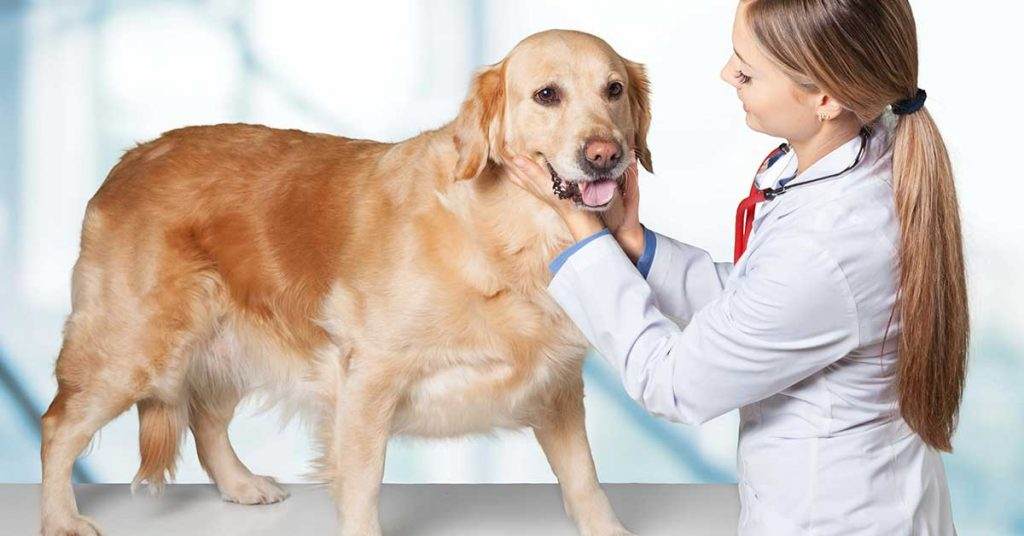Labrador Retrievers are medium to large-sized dogs, and they are recognized as being one of the most popular breeds of dogs in the US, and in the UK. Labs are bred in three main coat colors; yellow, chocolate, and black.
Not only are Labradors very popular household dogs due to their gentle, easy-going and loving nature, but they are also one of the most popular breeds used as therapy dogs and working dogs.
Originally, Labs were used as hunting dogs. Hunters realized that Labs were not afraid of a gunshot. They were found to have a love of the outdoors and be a part of the hunting scene. But it wasn’t just their steadfastness around guns.
Labs also have an inept love of water, which made them excellent dogs for retrieving water fowl and scurrying up and flushing out games for their owner to shoot. Working Labs are most often used in the military for bomb-detecting and other missions.
Police forces use them for narcotic searching dogs, cadaver dogs, missing people searchers, each and rescue efforts during tragedies, among other tasks.
These gentle, loving dogs love to keep busy and work, and they are eager to please their owners. They are also one of the easier breeds to train; which is no wonder they are so popular among families and in so many important working positions.
It’s hard to imagine that if Labradors are such great dogs in many ways, why there would be no reason why everyone shouldn’t own one. But believe it or not, there are things that anyone who is considering purchasing a Labrador Retriever, should consider first.
We have 30 detailed reasons for not owning a Labrador, and here they are:
#1 They are a big breed
As mentioned earlier, Labradors are big dogs. They are not only big on the doggy height charts, measuring up 21.5 to 24.5 inches at their shoulder, but they also weigh a good amount of weight, weighing in at 55 to 80 pounds.
Gender can play a role in a Lab’s weight. Typically females weigh less than males, but even females can be larger than a typical female should be, especially if it’s in her genetics to be larger. and of course, their weight can vary according to their diet and the amount of exercise they get. Regardless, if your wish is to get a true medium-sized dog, Labs do not typically fulfill that description.
#2 They Shed, a lot
If you are looking for a dog that doesn’t drop fur everywhere he goes in your home, then don’t look at Labs. Labradors are known to be big shedding dogs. Everywhere they go, and everything they touch, they leave a little (or a lot) of fur behind.
You will find fur on your floors, furniture, your bed, and especially your clothing. You will definitely want to invest in multiple types of cleaning products to help keep up with all the fur your home will accumulate, not to mention, a good lint roller for your clothes.
There are ways to help combat some of the shedding, such as regular grooming and brushing, however, if you are one who doesn’t like to spend time brushing your dog, or just don’t have time, you’ll not only have more shedding but other issues, too.
Dogs with a lot of fur need regular, one-to-two brushings a week to help keep their fur from getting tangled and matted, as well as prevent skin irritations from trapped dirt and debris.
Because Labs love outdoor time and hard play, they are prone to these problems, so veterinarians and groomers recommend investing in a good grooming brush and setting aside time each week to brush your Lab thoroughly.
If this isn’t something you can do, then you should seriously re-consider not purchasing a Lab.
#3 They’re expensive to keep
Any pet will cost you money, but some breeds will undoubtedly cost you more than others. First of all, the sheer size of them will tell you that you will be spending more on food and treats than you would for a small dog, and that’s just a start.
There are plenty of other reasons you’ll be shelling out money for a Lab. Here’s some of where your money will go:
- Crate – Early stages of puppyhood require keeping your dog contained in his own place so he doesn’t totally destroy everything with his little puppy teeth. It’s best to invest in a crate for training until you can trust him.
- Dog bed(s) – Dogs love having their own, soft bed to sleep and lounge in, so spending quality money on a bed or beds for your home would be recommended.
- Toys – Your Lab will go through the toys, especially as a pup. Their razor-sharp puppy teeth will tear through toys that aren’t puppy-tough, and mature Labs just have strong teeth and
- Treats – You can’t have a dog and not expect to give him treats. Treats also come in handy for training, so you can expect you will go through the dog treats with a Lab, and to get quality dog treats, expect to pay higher prices.
- Quality dog food – The same goes for dog food. Labs are big dogs and they eat a lot. Of course, you’d want them on healthy dog food to help grow a healthy dog, and for that, you can expect you’ll be paying higher prices, too.
- Dog training sessions – Whether you’ve owned a dog before or not, or even a Lab at one time, all dogs are different from how they learn and it’s always a good idea to get a professional to help you train your Lab right.
- Fence for your yard – If you don’t already have a fenced-in backyard, you might want to go ahead and do that so he will have plenty of space to roam outside without getting away from home.
- Vaccinations – Puppies need all their shots and if yours hasn’t had them all from who you purchased your pup from, you will need to complete those. Even once those are done, you will have yearly vaccines to keep up with.
- Spaying or neutering – when your puppy is old enough, you’ll want to get him or her spayed or neutered, unless you plan to breed them.
#4 They have a lot of energy
Oh yes! Labs are full of excitable energy and they are always wanting to let it out. Because these are born hunters and typically, working dogs, they need to be kept stimulated, both physically and mentally.
They need plenty of exercises to help release their energy and every day. They need games to play that help use their minds since mental stimulation helps to keep them happy and pacified.
If you don’t allow them the playtime they need outdoors, you might start to see them start having a change in their behaviors, from getting destructive in the home, barking more, getting more hyper in the home, among other outlets.
If you don’t have it in you to deal with a high energy dog, then don’t invest in a Lab, because they do have the energy to burn, and will.
#5 They require a lot of attention
Starting in puppyhood, Labs are big attention hogs. Puppies will require constant attention and training, which can be exhausting as a new dog owner. Lab pups have an incessant need to “mouth” which means they have to have their mouths on something all the time, you’ll recognize it as, nipping.
They will mouth (nip) on anything; hands, feet, your clothing, among other things, until you get him trained properly not to nip and mouth anything but their toys. They also want to be the center of your world.
If your lifestyle is so, that you don’t have the time or patience to give a Lab the attention he needs and craves, this wouldn’t be the dog for you. When a Lab is starved of attention, he’ll follow you on your heels, to get your attention.
If you don’t respond, he will take his frustration out on things around him, which most times, are your personal belongings, furniture, chew on walls, get into the garbage, and just about anything he can think of that might work to gain your attention.
If you can’t give a dog this kind of attention, then reconsider getting a Lab as they are quite needy and naughty if they don’t get what they need.
#6 Do you have enough space?
If you live in an apartment, a small condo, a mobile home, or anywhere else that has less than adequate space for a large dog to roam around, don’t get a Lab. It’s not only hard on you, to have a large furball underfoot in cramped quarters, but it isn’t fair to the dog either.
Little dogs can fit in just about any type of housing and be happy, but large dogs need adequate space, both indoors and outdoors. Unhappy dogs will typically create unhappy owners, and vice versa.
The bottom line is; little space? Then find a little dog to adopt or purchase and leave the Lab to those who have the type of space they need to give them a happy home.
#7 Labs don’t mature very quickly (they stay in expect)
It’s fun having a puppy around, but at some point, you hope they grow up and settle down a bit. With a Labrador, you can expect puppyhood to last for a bit longer than some breeds.
While many breeds mature at around two years of age, Labs may not hit maturity until at least five years of age, which means they will probably be pulling their little puppy antics and have all that puppy energy for some time. If you can’t deal, think about a different breed.
#8 Require grooming
As mentioned early on, Labs require grooming on a regular basis. If you own a lab, you can expect you’ll be spending some time brushing him and bathing too, every now and again, especially if dirty.
Other than at-home grooming, taking your Lab to a regular groomer on a regular basis will help keep his fur and nails really well kept so he stays healthy and happy with good fur, skin, and nails. When dogs look good, they feel good.
But keeping him looking good is pricey, not to mention, time-consuming. If grooming seems like a lot of work and too much time and money, there are breeds that are lower maintenance, so it’s best you pass on the Lab and find a breed that is easier upkeep.
#9 Veterinary bills can add up
All pets will cost you in the medical care category, but Labs might be a little “too” pricey for many who want a fairly low-cost and easy-care pet. Today there are pet insurances you can purchase, which can be costly, too, but they can also save money.
Your Lab will need yearly doctor visits to make sure they are healthy and get updated vaccines. There are also other tests they may run at each yearly visit, like, a stool check, blood work for heartworm checks, and anything else that might be going on with your pet at the time.
Most vets also prefer pets to be on a regular flea and tick preventative and heartworm preventative, which can vary depending on type and brand, however, preventative meds for larger breeds typically cost more than for small dogs.
#10 Not the best car travelers
Have you seen all the cute videos on social networks and TV commercials where people seem to take their pets wherever they go? It looks cute and fun, but when it comes to Labs, they aren’t always the best car companions, so don’t get excited about taking your Lab wherever you go. Labs are big, for one.
They consume a lot of car space which can really be hard to deal with in a small vehicle, not just due to lack of space, but the smells, too.
Labs can also get nervous and antsy in a car, and when they do, you might be trying to ward off a very big dog out of trying to crawl up into the front seat to get in your lap. If a dog that travels well and is easy to tote around with you is what you’re looking for, then you probably shouldn’t consider a Lab as a pet.
#11 Will need to be boarded if you go away
Of course, there will be times you go out of town when you own a pet and if you don’t have a petsitter already, then most likely, you’ll have to board your pet. Boarding can cost quite a bit of money, and big dogs are typically more expensive to board than small dogs.
You’ll also have to make sure their shots are up-to-date to board them and have specific ones, like the Bordatella. It can also be very stressful on dogs to be boarded and may deal with behavioral issues when you get back due to the trauma.
Labs can be sensitive to being left behind and away from their families. Something to consider before buying a Labrador.
#12 Do you have a big enough vehicle for toting him?
Yes, big dogs take up a lot of space, especially in cars, and with so many people trying to get better efficiency, compact cars these days, they may be good for gas mileage, but not for hauling around a big Labrador Retriever, so if you don’t plan to trade in your little Toyota, Yaris, you may not want to get a big dog like a Lab if you plan to take him with you on outings.
He may not be too happy about his little seat, especially when he’s not the best car rider anyway.
#13 Not the best guard dogs, if that’s what you want
Labs are super friendly dogs and love to greet anybody. They do have sweet personalities and temperaments, which is one big reason why, although they are big dogs, it doesn’t mean they are good guard dogs.
If a guard dog is what you’re looking for, this isn’t the breed for you. There are breeds known for being watchdogs or guard dogs, and Labradors are not known to be either.
#14 They may try, but not good lap dogs
Lab dogs are snuggly dogs that love to be in their owner’s lap, lapping up the love and attention, and most breeds that are considered lap dogs are small breeds, not large, such as the Lab. There is plenty of medium to large breeds that think they are small and snuggly and think their place is on the couch or in your lap.
They just won’t fit very well. You can make a place on your couch for your Lab, but you won’t exactly be getting a “lap dog” when you have a Lab, so consider their size before buying one.
#15 If you’re not good at saying “No,” training may be a problem
Some people just have a hard time saying “no,” whether it’s to their friends, family, children, or their dog. The problem with dogs is they get mixed signals if you don’t correct them on their unwanted behaviors by telling them, “no.” Labs are super hard to say “no” due to their sweet facial expressions and personalities.
Just ask any Lab owner. But just ask any dog trainer, if you can’t say “no” and give in to your Lab’s every whim, you will be dealing with a very ill-mannered (large) dog, and no one wants that.
#16 Can be rambunctious around small kids
Big dogs and little kids don’t always mix well together due to the size difference. Even if your Lab is fairly well trained, there are going to be times this high-energy breed may get a little rambunctious in the house and accidents can happen.
If you have small children, they should always be supervised around any dog, especially a large dog who has the capability of knocking a child over or injuring them in any other way. Having small children in the house is a reason for not owning a Labrador.
#17 They can be destructive chewers
It’s the nature of dogs to chew. It’s instinct, and it’s actually healthy for a dog’s gums and teeth to chew, however, you want them to chew on the right things. Labs can be very mischievous and this translates to, destructive.
When Labs get upset, nervous, aren’t trained properly, or just bored, they can be destructive chewers. For your home and belongings, this means lost property, and money shelled out to replace items. If the destruction of your property isn’t your idea of having a dog, don’t own a Labrador.
#18 Your backyard may see some destruction
When dogs get outside, it’s like they instantly feel this sense of freedom and all their manners and training seem to go out the window. Labs will cut loose in their backyard and if there’s anything they can get into or wreck, they will, or may try.
They may destroy a hose, a sprinkler, destroy a kiddie pool, ruin an outdoor chair, or run tracks in your lush lawn. Labs aren’t the best dogs for a backyard that you take pride in, which is why, if you treasure your yard, maybe a Lab isn’t a breed you should own.
#19 You need a way to keep him contained (fence)
Dogs love walks and they should get daily walks on a leash. But big dogs also love to romp and play, and you can’t always give that type of playtime on a leash. If you are a runner and your dog loves to take a run with you, that’s great.
Otherwise, having a fenced-in back yard is really the best option for a Lab. You can let him out to get some run and playtime without having to worry about him taking off down the street.
But if you don’t already have a fence, that’ll be an expensive expense for your pet, no matter what type of fencing you choose, they all cost a bit of money.
If you don’t live in a home where a fence can be added, daily walks and maybe time at a dog park will suffice, and if you don’t have time for that, reconsider a Lab as a pet.
#20 Pee spots can destroy lawns
Are you a fanatic about your yard? Do you love to work on your lawn all spring and summer and admire the green lush grass you grew and how manicured it looks? Having a Lab will quickly either get you to stop caring so much about lawn-perfection, or, it will drive you crazy to have a Lab because what you will find all over your lush green lawn, are yellowish, dead areas where your Lab has picked his favorite spots to pee, and pee, and pee, until eventually, those areas die and leave ugly bare spots.
So, if your lawn means everything to you, a Lab definitely will not help do your lawn any favors.
#21 Labs are known to be big destructors of flower beds
Labs are diggers by nature and there’s one thing they love, and that’s a beautiful flower garden. It’s not that they love the fragrance of flowers or beautiful colors. They love the dirt and the fun they have in the garden. Labs will dig up all your hard work of planting flowers.
Like deer come into your yard and destroy your foliage, Labs can do just about the same damage, only this culprit just may need a bath after his fun and destruction. If you have a garden you love, a Lab isn’t the dog for you.
#22 Labs can’t be left alone inside for too long
Your dog loves you and misses you and although that is sweet, it can be a bad thing if he has to miss you for too long. Some breeds of dogs have no problem with being left alone for long periods of time in the house.
Then, there are other breeds who can’t stand to be alone and either get bored or develop anxiety issues. Both boredom and anxiety lead to destructiveness in dogs. You may come home from work to find your couch cushion destroyed, the garbage everywhere, or a wall partially eaten.
Don’t buy a Lab if you and your significant other work and have to leave your Lab alone long hours. You may not have a home when you get back.
#23 They’re susceptible to congenital health issues
Aside from hip dysplasia, which is common among several big breeds, Labs also run the risk of other congenital disorders. There is also elbow dysplasia, PRA (Progressive Retinal Atrophy ), or, blindness, ear infections, and obesity.
It’s important you get your Lab from a reputable breeder to help reduce the risk of congenital issues, but it won’t completely rule that out. If you own a Lab you have to be prepared to deal with a health issue that may pop up, and if that doesn’t suit you, you shouldn’t buy a Lab.
#24 Labs gain weight easily due to genetic disposition
Just like humans, dogs have genetic dispositions and obesity is in a Lab’s genetics. Labs are one breed that tends to struggle with weight issues. If they aren’t fed good nutrition or get enough exercise, they can become obese.
Obesity in Labs can be dangerous as it can create other health issues, like hip and back issues, heart problems, to name a couple. It’s important your Lab follows a strict diet, don’t over-snack them, and exercise them daily. Can’t deal? Then you shouldn’t buy a Lab.
#25 Big dogs are prone to hip dysplasia
Hip dysplasia is a common problem in large breeds of dogs and because Labradors are considered a large breed, this would be something you would need to be concerned about as your Lab got older. Hip dysplasia is a malformation of the hip joint and can cause big problems with a dog’s ability to walk and run in their older years.
It’s common in Labs, and not always detected until they are older. If you aren’t the type of owner to deal with a large dog with the possibility of hip problems, don’t buy a Lab.
#26 If not trained, they can develop a habit of jumping
No one likes a jumping dog. Especially a big, jumping dog. It’s not only unpleasant to be jumped on by a big, furry animal, but it can be outright dangerous.
Children, elderly people, or even those who are just plain terrified of dogs, it can really be a dangerous situation if your dog jumps.
If you do not get Labs trained properly, it can easily create a bad habit of jumping, and once they think it’s acceptable, it’s a very hard habit to break. The last thing you want is the responsibility of someone being hurt.
#27 Labs are expensive to buy
Unless you plan to adopt a Labrador from a rescue or a pound, then you will probably have to purchase a Lab from a (reputable) breeder.
But do you really know how much a Lab puppy costs? To buy a pure-bred Lab, you can expect to pay anywhere between $800-$1200, depending on the breeder, the type if Lab you’re buying, among other factors.
The bottom line is, if you can’t afford to spend this on a dog, you shouldn’t buy a Lab, especially since you’ll be spending much more as you own him.
#28 If you own a pool, you may have a hard time keeping him out!
Labradors have a huge love of water. As mentioned earlier, they were bred to retrieve water fowl for their owners, which means that they are more than willing, and would love to run and jump into anything holding water, a lake, a pool, anywhere they can get wet.
If you have a swimming pool in your backyard and don’t particularly care for your dog just taking a swim anytime he feels like it, you may not want to buy a Lab, because if your Lab is unattended in the yard, you’ll probably find him in the pool.
#29 They’re bred as hunting dogs, so you may find he chases small animals
As a hunting dog, retrieving and scurrying up small animals is what Labs love to do. It’s their nature, so one might expect that if a Lab saw a small animal in the yard, his instinct would be to run after it.
It may not be a big deal in the yard where the squirrel can escape up a tree, but for a neighbor’s cat or little dog, a Lab chasing after it could be a big deal. Labs need to training to break this instinct and obey your commands, so if you worry you might not be able to control a Lab in this way, they’re not for you.
#30 If you’ve never trained a Lab, you’ll need to invest in dog training classes
Any dog could benefit from dog training classes. Some breeds really need some professional training, especially if they are large breeds, making them harder to handle. Especially if you aren’t experienced in owning or training a big dog.
Labs are a breed that, if trained right, can be good dogs. Left untrained, they can develop bad dog behavior and become difficult for even experienced owners to handle. If you aren’t willing to spend the money or the time in training classes, you shouldn’t own a Lab.
References
- https://www.sciencedirect.com/science/article/pii/S0168159106002681
- https://www.indianjournals.com/ijor.aspx?target=ijor:ipo&volume=12&issue=2&article=024
Table of Contents




